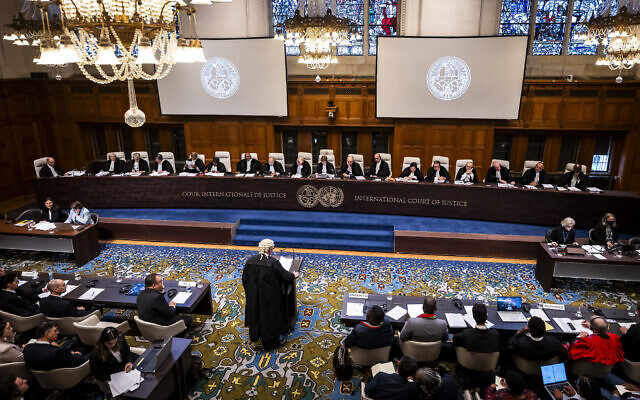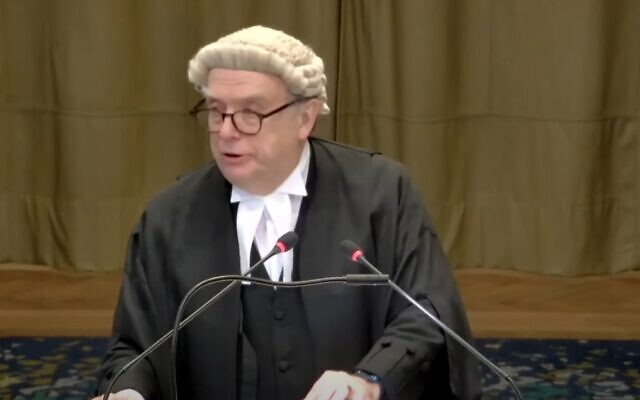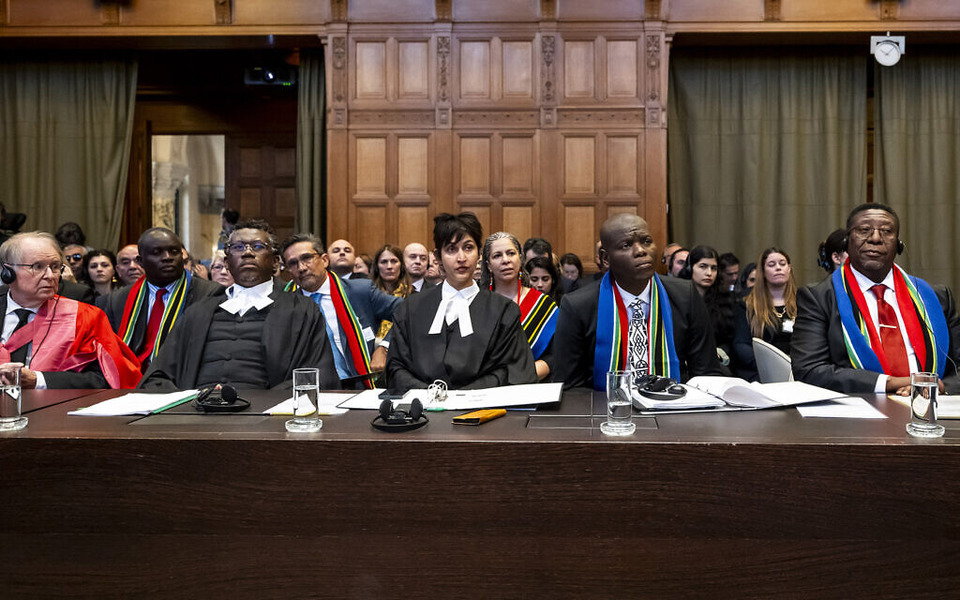Israel is charged with the gravest crime a country can commit, in cynical misrepresentation of reality designed to deny it the right to self-defense against a truly genocidal enemy writes the Times Of Israel.
THE HAGUE — Genocide is the crime of crimes, “the ultimate in wickedness,” said Prof. Malcolm Shaw KC, representing Israel during hearings in the International Court of Justice last week.
Deliberately destroying, or trying to destroy, an entire people simply because of who they are is widely accepted as the single worst thing a state can do.
By extension, it is also the very worst thing a country can be accused of. So to travel to The Hague in the Netherlands to hear those accusations leveled against the State of Israel was extremely jarring, to say the least.
There, in a city whose very name is a byword for the rule of international law, the Jewish state was hauled before the World Court to defend itself against the most damning accusation possible: that it is deliberately and maliciously trying to destroy the Palestinian people in Gaza.
For over three and a half hours on Thursday, the members of the South African legal team provided grisly details of the destruction wrought in Gaza during the current war, sparked by Hamas’s barbaric assault on Israel on October 7.
But mention of that infamous day was almost entirely absent from the tale the South Africans told, an unsettling oversight that only got worse as the hearing proceeded.

Even more astonishing was the manner in which South Africa’s attorneys entirely failed to mention the way in which Hamas has cynically and deliberately placed Gaza’s own citizens, men and women, children and elderly, in harm’s way.
Dr. Adila Hassim for South Africa specifically referred during her oral arguments to the damage done to Gaza’s medical infrastructure, as part of Israel’s allegedly genocidal effort against the Palestinians in the territory.
But incredibly, not even once did she allude to the documented manner in which Hamas has comprehensively exploited Gaza’s medical facilities as cover for its military operations, whether tunnels dug under hospitals, ambulances used to transport terrorists, or hospitals used to hold hostages.
Inside the Palace of Peace, as the splendid edifice housing the ICJ is called, this correspondent waited with mounting incredulity for Hassim to make the smallest acknowledgment that there may be an underlying reason why such terrible damage has befallen Gaza’s health system during the current conflict. In vain.
But worse was to come when the eminent British barrister Vaughan Lowe took to the podium to outline the provisional measures South Africa has asked the court to order against Israel.
Lowe, a king’s counsel and professor of international law at Oxford University, no less, declared that Israel did not even have the right to self-defense in its actions in Gaza, since, he argued, Israel controls the access points into and out of the territory.
“Its actions are enforcing its occupation,” claimed Lowe, eradicating from history in one fell swoop Hamas’s atrocities of October 7, its ongoing rocket attacks against Israeli population centers, and its violations of the laws of armed conflict.
In essence, Lowe was arguing that Israel was legally barred from trying to ensure that its citizens do not face a repeat of perhaps the most savage terrorist atrocity ever witnessed in the modern world, an attack that Hamas has declared it seeks to replicate over and over again.

As worrying and saddening as this position was, a revelation the following day made Lowe’s argument even more insidious.
Addressing the court on Friday, legal adviser to the Israeli Foreign Ministry Dr. Tal Becker pointed out that Lowe has expressed a very different legal opinion in the past.
“The right of self-defense is a right to use force to avert an attack,” Lowe wrote in a study published by the Chatham House think tank in 2005. “The source of the attack, whether a state or a non-state actor, is irrelevant to the existence of the right… Force may be used to avert a threat because no one, and no state, is obliged by law passively to suffer the delivery of an attack,” he argued then, as quoted by Becker.
And yet, before the 17 judges in The Hague, Lowe had essentially asserted that one state is “obliged by law passively to suffer the delivery of an attack”: Israel.
Leaving aside for a moment the consequences for Israel’s very existence, were it to abide by this argument, it was the effort to manipulate the highest international court in the world via such disingenuous claims, to weaponize the judges against Israel, that was so disturbing during the hearings in The Hague.
For Hassim to have acknowledged that Hamas has abused Gaza’s health facilities for military purposes would have been to undermine her case that Israel has intent to destroy the Palestinians.
For Lowe to have acknowledged Israel’s right to self-defense would have been to admit that there was actually some entity against which Israel needed to defend itself.
And so, in defiance of the facts, they elected not to acknowledge them.
One hesitates to use the word mendacious, but, given the circumstances, its deployment seems inescapable.

None of this is to detract from what is a truly dire situation in Gaza, where thousands of innocent people have been inadvertently killed by IDF fire, tens of thousands more have been wounded, large swaths of the territory have been laid waste, and vast segments of the population are suffering from awful temporary living conditions, and have no permanent homes to go back to.
But none of that was what the proceedings in The Hague were about. South Africa claimed one thing: that Israel is committing genocide.
Its legal team disregarded the fundamental problems with such a grave allegation in order to advance that charge, whether due to willful blindness borne of a deep-seated sympathy with the plight of innocent Gazans, or, sadly far more likely, something more sinister.
Mercifully, following the tumult of the court hearings on Thursday and Friday, the tranquility of Shabbat descended soon after they ended and, writing my report en route, I took the train to Amsterdam.
But it was on Shabbat morning, during a visit for prayers at the monumental Spanish and Portuguese Synagogue, that what had transpired truly hit home.
There, in a courtyard outside the magnificent synagogue, which was completed in 1675, was a plaque memorializing the 3,700 of the community’s 4,300 members — 86 percent of the prewar congregation — who were murdered in the Holocaust, the Nazi genocide of the Jews.
And that was when the discordant notes of the previous two days rang most poignantly: In one of the countries where the Nazis tried to extinguish the Jewish people, the state of the Jews had just been tried on genocide charges — for defending its citizens from the viciously demonstrated genocidal ambitions of Gaza’s ruling terrorist army.
And, perhaps worst of all, it is by no means certain that the judges will dismiss the foul accusations for the cynical misrepresentations, distortions and omissions that they are.

